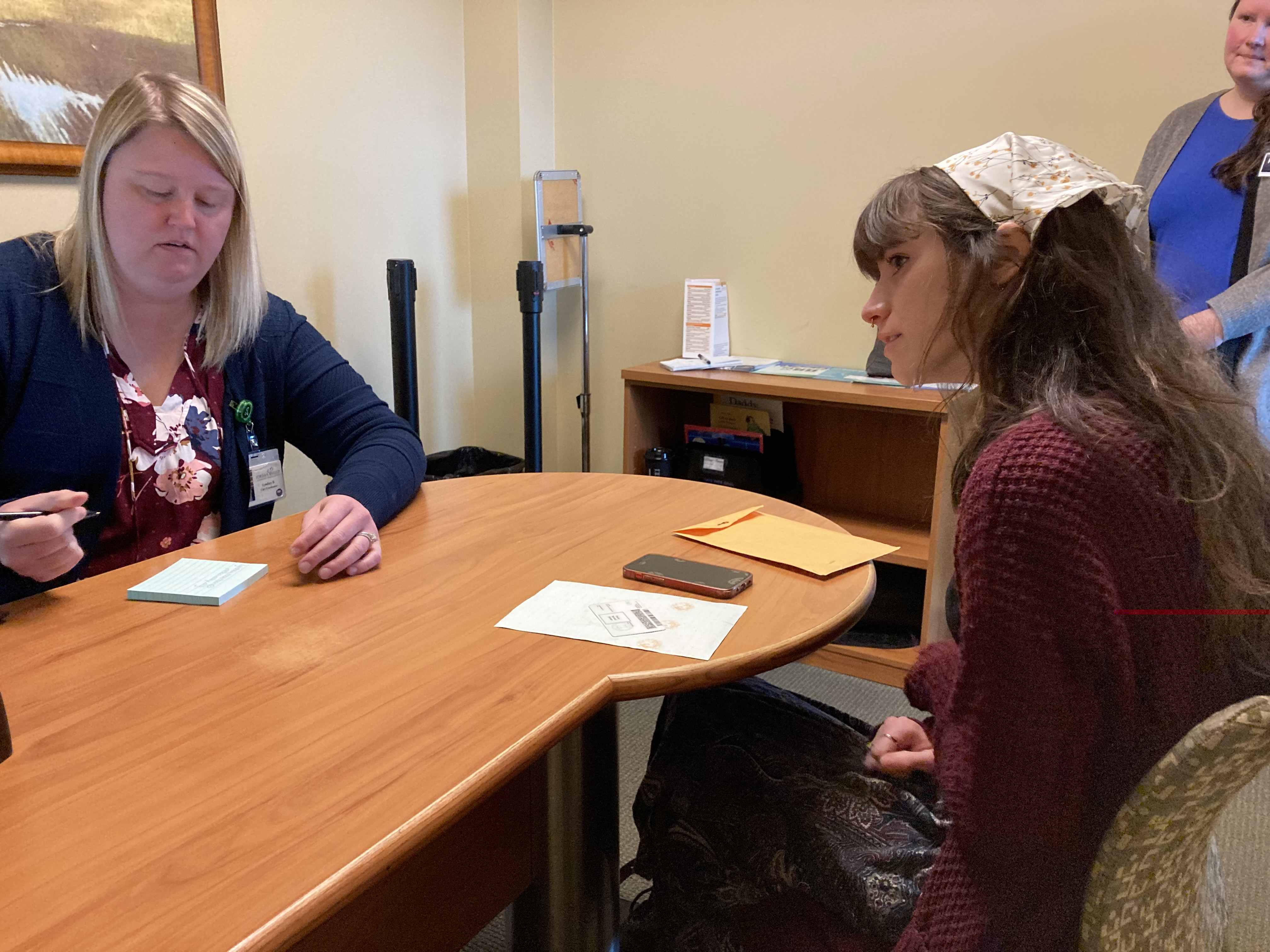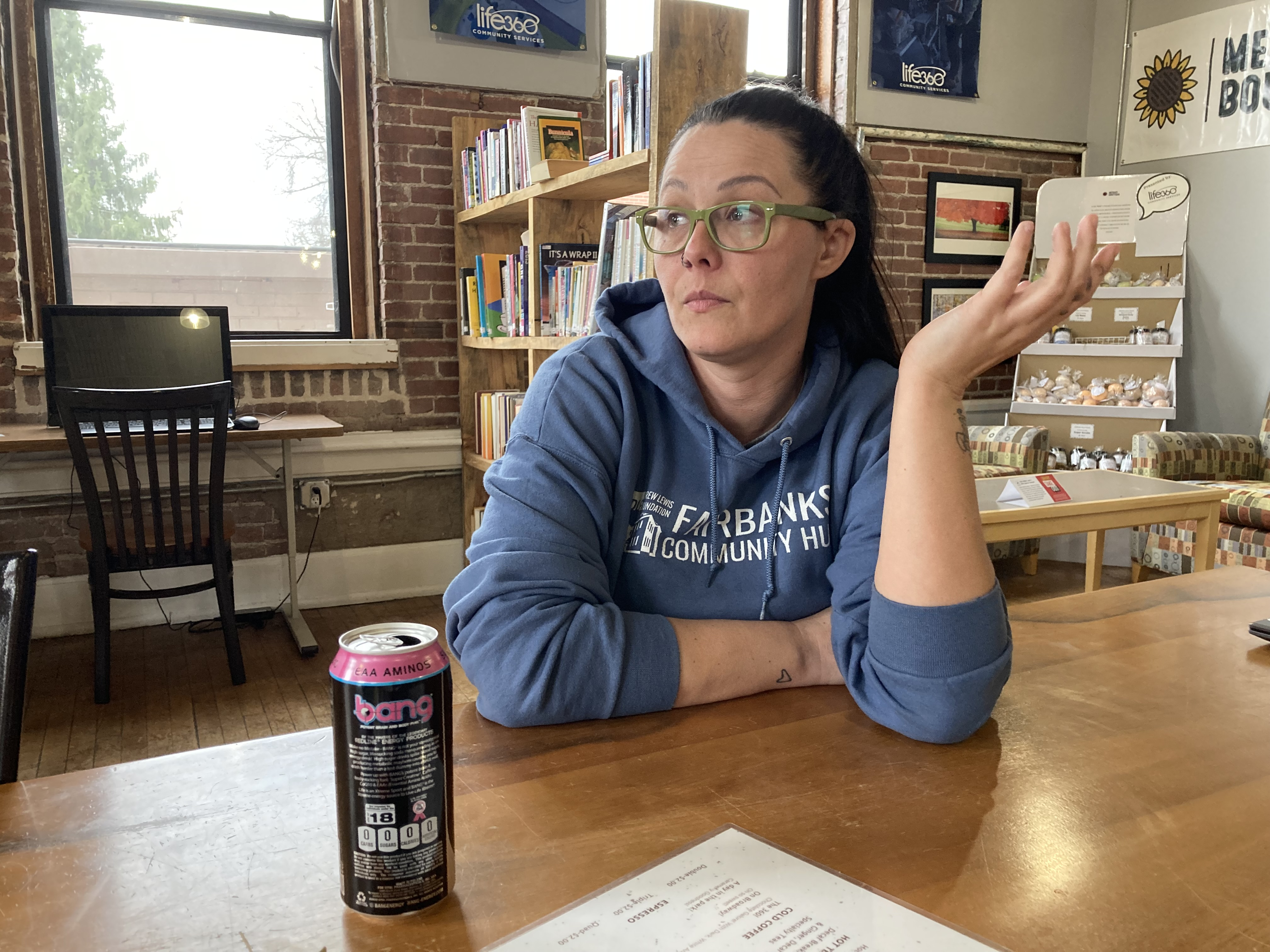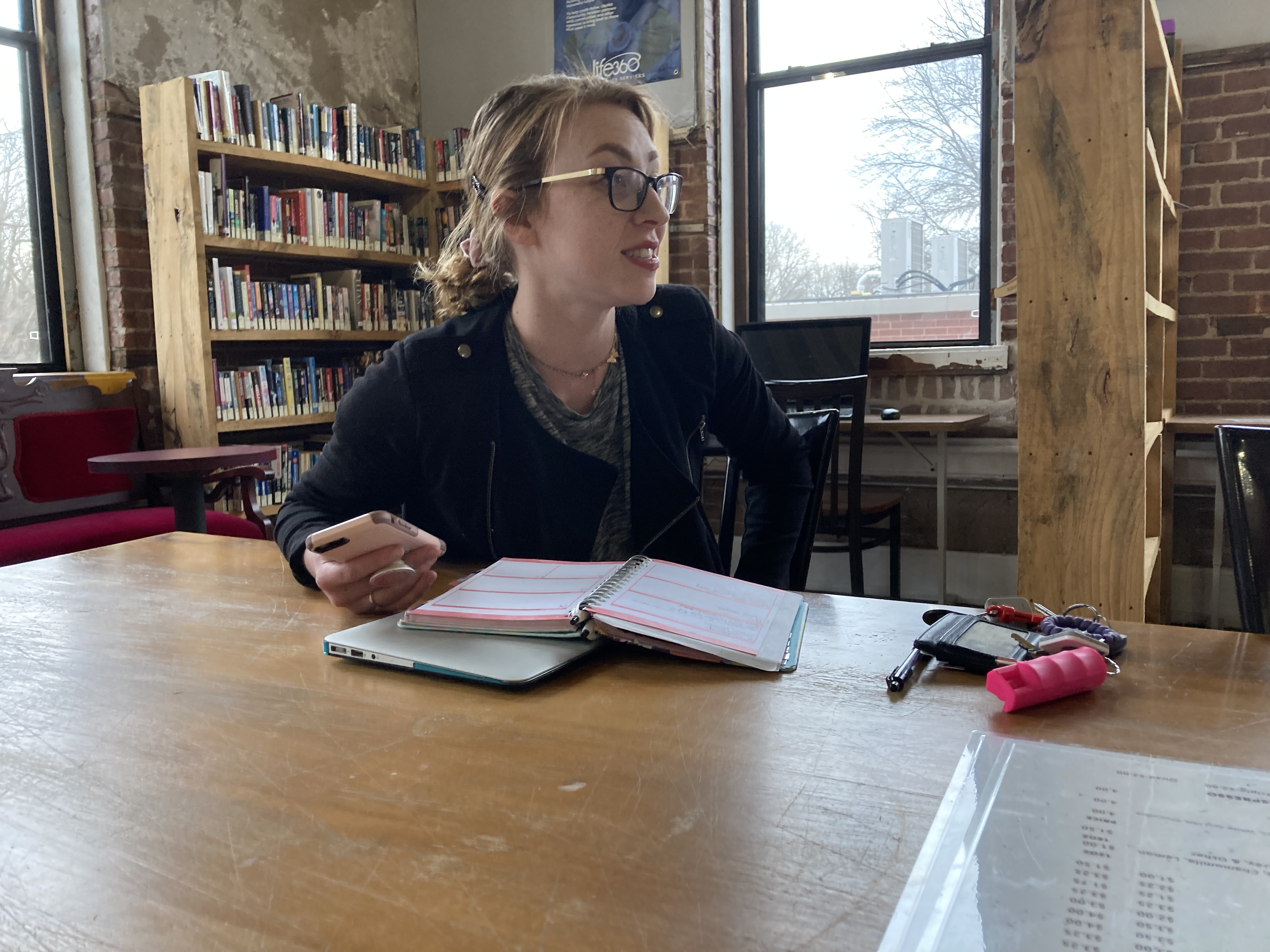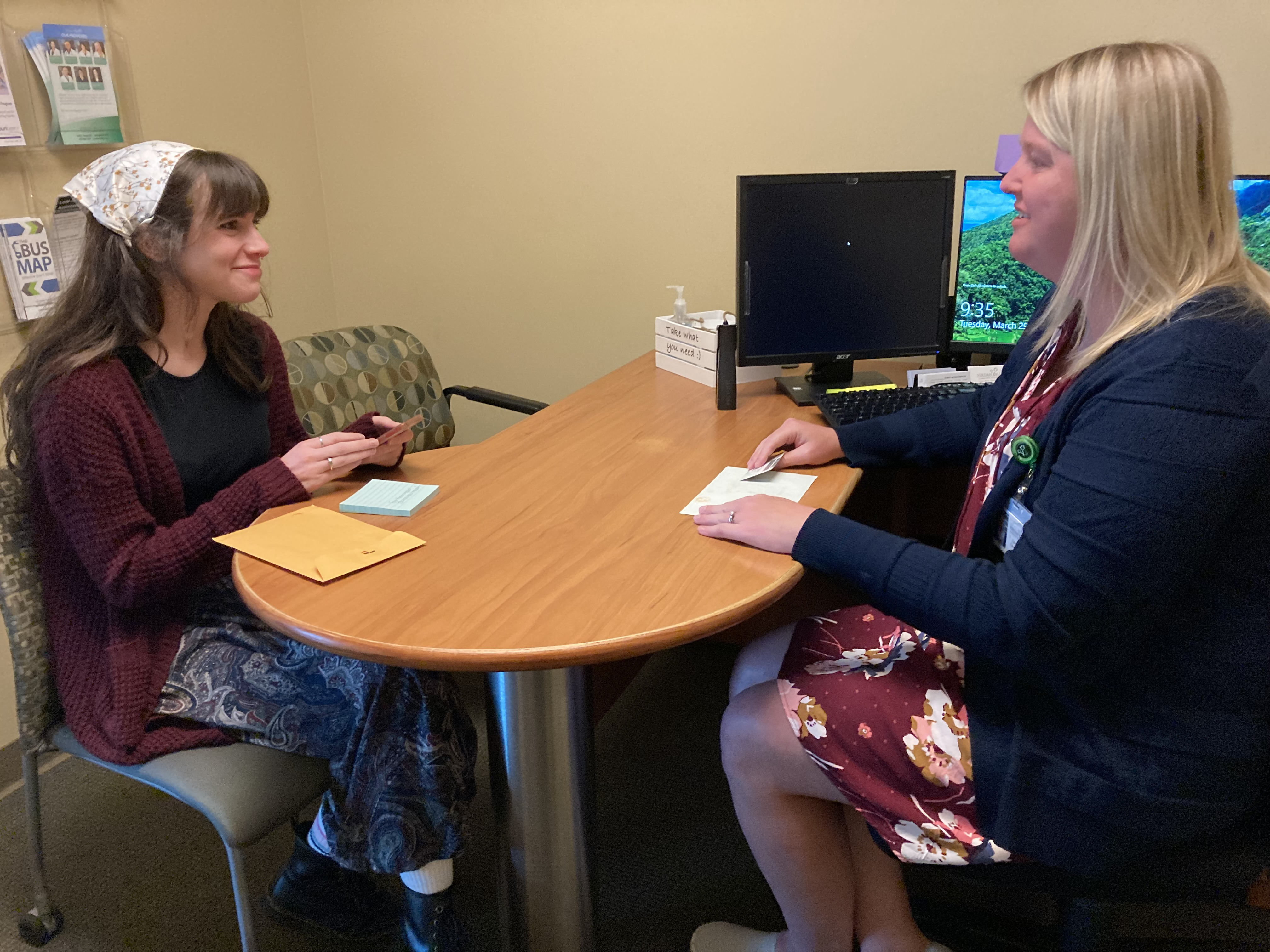Summary
Since a circuit court ruled in August of 2021 that the Department of Social Services could no longer delay Medicaid expansion, some 275,000 Missourians became qualified for Medicaid. However, many are experiencing long delays in getting approved. Others are being denied, even though they qualify. Two Springfield women shared their experiences with applying for Medicaid.
When Kelly Roe discovered a mass in her chest last October, the Missouri State University grad student didn’t hesitate to seek a doctor’s care.
When Roe was 19, her mom died of cancer following a nearly decade-long battle with the disease.
Now age 25, Roe said she’s been told her genetic predisposition looks a lot like her mother’s, and that she is at higher risk of developing cancer some time in her life.
And with Medicaid expansion finally happening in Missouri, Roe qualified for coverage and applied in November 2021. She then had a regular biopsy on the mass in December. Surgery (an excisional biopsy) to have the mass removed followed in January of this year.
While Roe is incredibly grateful the mass turned out to be benign, her mounting medical bills are causing a great deal of stress and worry.
Whenever Roe called to check on her Medicaid application (which turned out to be a four-hour ordeal), Roe was told she had filled everything out correctly and that coverage should kick in at any time.
Her application has been flagged as overdue at least two times.
But as of last week when she was interviewed for this story, Roe had yet to be approved for Medicaid.
A friend created a GoFundMe that raised $5,000 to pay for Roe’s original biopsy. She still owes more than $12,000 for the surgery and other appointments.
If she were to be approved, Medicaid benefits would retroactively cover her bills for a full three months prior to the month in which her application for Medicaid was filed.
“If they don’t get back to me until late April or May,” she said, “I’m out of luck.
“It’s more money that will have to go into collections,” Roe continued. “I already have student debt to pay.”
In addition to being a full-time student, Roe has a part-time job at a nonprofit. She works hard to keep her credit score up by paying all her bills on time and paying off her credit card debt.
“But this is such an insurmountable pile of money that I owe,” she said. “It’s really scary.”
Wait time in Missouri is more than twice what federal law allows

Why care?
Having access to health care can transform someone’s life, according to Dr. Matthew Stinson with Jordan Valley Community Health Care Center. But many Missourians who qualify for Medicaid and applied in recent months are having to wait months to be approved. There were nearly 72,000 Missourians who had Medicaid applications still pending as of February.
Roe is hardly alone with her issues with getting approved for Missouri’s Medicaid health care coverage in recent months.
There were nearly 72,000 Missourians who had Medicaid applications still pending as of February, according to the Department of Social Services website.
Also in February, the average wait for the DSS to process a Medicaid application was 119 days.
That’s more than two and a half times the 45-days allowed by federal law.
The enrollment backlog problems were noted in a recent report from the Missouri Independent.
After the courts ordered the state to enroll anyone who was eligible for health care under voter-approved Medicaid expansion, Missouri has lagged behind other states in getting applications processed, the Independent reported.
According to the Missouri Independent, state officials have repeatedly pointed to staffing shortages as part of the reason why, and have promised wait times will decrease.
“We’re committed to pulling every lever we can to bring those processing times back within that 45-day window,” Todd Richardson, MO HealthNet division director, told lawmakers last month, “and expect that we’ll start to see some momentum on that in the coming weeks.”
A timeline of Missouri’s legislative and judicial challenges to Medicaid expansion
Aug. 4, 2020: Missouri voters approved Medicaid expansion via a ballot referendum, following the path of six other states. The amendment modified the Missouri Constitution to adopt Medicaid expansion for individuals with incomes up to 138 percent of the Federal Poverty Level.
April 28, 2021: Missouri legislature did not appropriate funding for Medicaid expansion.
May 13, 2021: Gov. Mike Parson announced the state will not implement Medicaid expansion and withdrew state plan amendments.
May 20, 2021: Advocates filed a lawsuit against Missouri’s Department of Social Services.
June 23, 2021: A Circuit Court ruled in favor of the State and Medicaid expansion was halted.
July 22, 2021: The Missouri Supreme Court ruled in favor of Medicaid expansion moving forward.
Aug. 10, 2021: A Circuit Court ruled DSS can no longer delay Medicaid expansion.
Department of Social Services spokesperson Heather Dolce told St. Louis NPR that the Family Support Division was “aggressively tackling” the backlog by offering staffers overtime and prioritizing the oldest applications.
But health advocates criticized the agency for hiring third-party vendors to check the income and address information, which sometimes results in bad data that department staffers must fix, the STLPR station reported. For example, some Medicaid recipients were erroneously flagged as living out of state, triggering a removal and appeals process. The state has paused residency checks at least through February.
Roe said she feels sorry for the state employees who are tasked with processing applications.
“I know they’re overextended and I can’t imagine how swamped that they are,” she said. “I have no idea what their caseload looks like. I’m sure it’s ridiculous and impossible. I don’t want to put the blame on the people that are currently drowning in their work.”
Since a circuit court ruled in August of 2021 that DSS could no longer delay Medicaid expansion, some 275,000 Missourians became qualified for Medicaid.
Other problems with Medicaid applications reported
Monica Swadley, a Springfield mom of four, was among those who suddenly qualified for benefits last year.
She has a full-time overnight home health care job and works part time at The Fairbanks, a community center in the Grant Beach Neighborhood. But prior to the expansion, Swadley could not afford private health care coverage and desperately wanted to be able to see a doctor again.
So when she learned Medicaid expansion was happening, Swadley applied for benefits on the Missouri Department of Social Services’ website.
Since much of her duties at the Fairbanks include helping other people apply for state assistance programs, Swadley knew she qualified and knew how to navigate what can be a confusing application process.
(The Fairbanks is home to the Drew Lewis Foundation’s RISE Program, which helps people get out of poverty by providing resources and empowering families to increase their self-sufficiency and stability.)

Not long after filling out the online application, Swadley learned she was denied Medicaid coverage and instead was approved for the state’s Uninsured Women’s Health Services program.
“Which is a crock anyways. You can get the same stuff at Planned Parenthood,” Swadley said of the women’s health coverage. “It’s basically nothing: a pap smear, birth control maybe. But Planned Parenthood does the very same thing and probably has more options and less crap to deal with.”
Swadley reached out to Meghan Storey, director of personal development for the Drew Lewis Foundation, for help. Storey put Swadley in touch with someone at Jordan Valley Community Health Center who has access to the “backside” of DSS’s website and into Swadley’s application.
Almost immediately the problem was fixed, Swadley said, and she now had Medicaid coverage.
Storey said she personally knows of five people who qualified for Medicaid, but were denied coverage when they applied online. She’s heard from others who say they’ve been told paper applications mailed in aren’t even being looked at.
Storey said there’s been talk among advocates who are wondering why state officials are not doing more to make the application process easier or to let more people know they now qualify.
Storey said it’s been really frustrating for some of the families who shared their stories publicly and advocated for the law to be passed.
“So many of the people who have fought for this — they did interviews and everything — they still haven’t qualified for it,” Storey said. “So does their voice actually matter?
“There has to be a better way,” Storey said. “Are we trying to hide this amazing program? We see in other states how Medicaid expansion can benefit so many people.”
Help available at Jordan Valley Community Health Center

As of last week, staff at Jordan Valley Community Health Center had helped more than 2,000 people apply for Medicaid expansion. Last week alone, 127 people applied for Medicaid with help from Jordan Valley staff.
That’s where both Roe and Swadley turned to when seeking help with their applications.
According to Dr. Matthew Stinson, Jordan Valley’s vice president of medical and behavioral health services, anyone needing help navigating the sometimes-confusing Medicaid application process can call 417-831-0150 or simply walk into the Health Center at 440 E. Tampa St.
There’s an information desk and booth clearly marked with a sign that says, “Apply for Medicaid insurance here!” in the lobby.
Stinson explained that Jordan Valley’s community health workers are the ones who can help folks with the application process.
Jordan Valley also has a state-sponsored MoHealthNet worker in the building who is employed by the state, not Jordan Valley.
“So they have access to the system and, at times, can see where an application is hung up,” Stinson said. “The application process from MoHealthNet (Missouri’s Medicaid program) is complicated.”
“In the fall, when Medicaid expansion kicked in, there really wasn’t much of a delay in applications,” he said. “There has been more of a delay as we’ve gotten further out.”
Stinson noted that Medicaid expansion has been a complicated and controversial topic in Missouri.
He believes some of that stems from people not really understanding what a difference health insurance can have for people.
“People who have insurance don’t realize the ability that they have to access care,” he said. “When you start thinking about Medicaid and what it allows — it allows an adult to have access to regular medical care, as well as to dental care. And for some people, they haven’t had access to dental care all their life.
“We’ve seen people who couldn’t get their teeth worked on,” he continued, “that it’s changed their ability to work because they have a mouth that doesn’t look decayed, so they are not afraid to smile.”
And looking at Medicaid expansion from a fiscal responsibility perspective, Stinson said there’s actually a “pretty big return on the investment that’s made, especially when you are talking about pregnant women and children, and people who’ve never had the ability to access care.”
It also gives people who would otherwise seek health care in an emergency room an opportunity to access care in clinic settings, Stinson said.
“Medicaid can, if someone knows how to use it well, help transform someone’s life,” Stinson said.
MSU grad student still waiting for Medicaid
Roe, the Springfield woman who first applied for Medicaid some four months ago, went to Jordan Valley last Tuesday for more assistance with her application.
Lyndsey Robertson with Jordan Valley helped Roe upload more documentation and a copy of her driver’s license to the state’s website, thinking that might help speed up the process.
Robertson said it’s felt very rewarding to help so many get health insurance through Medicaid expansion, but said there’s been a lot of people — like Roe — who’ve experienced difficulties.

Roe feels that in many ways, she is in a lot better position than others trying to get their Medicaid benefits. She said she understands the system and knows how to advocate for herself.
Also, she doesn’t have kids and her work is flexible. That means she can carve out four hours in her day to spend on the phone (mostly on hold) with DSS.
“I know without a shadow of a doubt there are so many people that don’t have that luxury,” Roe said.
Roe had someone at Jordan Valley Community Health Care Center check on her application and was told it had already been flagged at least twice as being overdue. But she’s still not been approved.
“I asked Missouri DSS, like, ‘Hey, at this point, if it’s going to take this long for me to get Medicaid, could I please just pay for a Marketplace Health Care plan?’” she said. “It would be something that would definitely hurt me financially, but I mean — I just need health care. I need something. But because I qualify for Medicaid, I cannot get a Marketplace Health Care plan.
“The citizens of Missouri deemed that expanding Medicaid and making it more accessible was clearly a good choice and a good idea,” Roe said. “But if you’re not actually funding the Department of Social Services to get these people on Medicaid, then it means nothing.”

